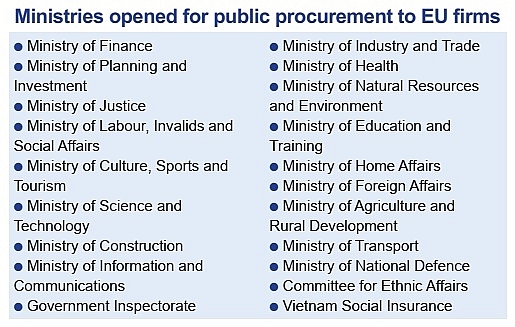All-new playground for EU business
An official from the Ministry of Planning and Investment (MPI) told VIR that the selection of bidders for public procurement packages in certain sectors “will see some big changes, with competition to further stiffen in the market.”
 |
Under the EVFTA, from now until July 31, 2025, EU firms can join bidding packages in many ministries (see box), cities, and provinces, and state-owned enterprises (SOEs).
First, at central agencies, bidding packages for goods purchase, consultation, and non-consulting, the price is a special drawing right (SDR) of 1.5 million ($2.3 million) or higher. For construction bidding packages, the price is SDR40 million ($56.52 million) or higher. At local-level agencies and others, the price of these bidding packages is SDR3 million ($4.2 million). The threshold for construction bidding packages is SDR40 million ($56.52 million). The SDR is an international reserve asset, created by the International Monetary Fund.
Regarding medicine purchase at healthcare agencies, in case the bidding package includes only one drug, the price is SDR130,000 ($191,000).
Vietnam has committed to allowing EU suppliers to bid for up to 50 per cent of the pharmaceutical purchases by the Ministry of Health and many of the hospitals under its control, as well as major research facilities. This will occur over a period of 15 years.
The EU penetration is expected to heat up competition in the local public procurement market which was in the past restricted to domestic firms. In January 2019, Vietnam also opened the market to 10 member countries of the Comprehensive and Progressive Agreement for Trans-Pacific Partnership (CPTPP) in some sectors. However, the access under the EVFTA is wider than in the CPTPP as EU firms can join bidding in more instances.
Market watchers said that the EVFTA will create a new chapter for public procurement, enabling the country to balance value and quality. Specifically, Vietnam can approach high-quality goods and services, and attain technology and strong expertise from the EU, while possibly excluding unqualified contractors and creating a healthy and competitive market. The competition is also good encouragement for Vietnamese firms.
Currently, Chinese firms profit the most from Vietnam’s procurement market, with about 90 per cent of power, mining, manufacturing, ferrous, and chemical contracts of SOEs going to them. Many projects with involvement of Chinese contractors have caused sluggishness and negative social impacts. Vietnam’s public procurement is a magnet to EU businesses as it has one of the highest ratios of public investment to GDP in the world. The Vietnamese government is the biggest purchaser of goods and services in Vietnam, accounting for 35.7 per cent, or $26.45 billion, of total capital expenditure in 2018.
Thus far, several big EU firms have appeared seeking business and investment opportunities in Vietnam. For instance, Ulf Rudebark, SEK, SAAB, Asix Communications, and Volvo have shown interest in Long Thanh International Airport.
EU companies are also showing interest in bidding contracts for key national transport projects such as the Eastern Cluster of the North-South Expressway, the third terminal of Tan Son Nhat International Airport, and other expressway projects.
In the lucrative pharmaceutical industry, the right to join tenders in over 30 hospitals is good news for multinationals like Novartis, Sanofi, AstraZeneca, and Hoffman-La Roche, enabling them to expand footprint. Currently, the ethical drugs channel is the most profitable, accounting for around 70 per cent.
The MPI in early August issued Document No.5079/BKHDT-QLDT on the country’s EVFTA commitments on public procurement so that local and central authorities can make preparations.
What the stars mean:
★ Poor ★ ★ Promising ★★★ Good ★★★★ Very good ★★★★★ Exceptional
 Tag:
Tag:
Themes: EVFTA & EVIPA
Related Contents
Latest News
More News
- Hermes joins Long Thanh cargo terminal development (February 04, 2026 | 15:59)
- SCG enhances production and distribution in Vietnam (February 04, 2026 | 08:00)
- UNIVACCO strengthens Asia expansion with Vietnam facility (February 03, 2026 | 08:00)
- Cai Mep Ha Port project wins approval with $1.95bn investment (February 02, 2026 | 16:17)
- Repositioning Vietnam in Asia’s manufacturing race (February 02, 2026 | 16:00)
- Manufacturing growth remains solid in early 2026 (February 02, 2026 | 15:28)
- Navigating venture capital trends across the continent (February 02, 2026 | 14:00)
- Motivations to achieve high growth (February 02, 2026 | 11:00)
- Capacity and regulations among British areas of expertise in IFCs (February 02, 2026 | 09:09)
- Transition underway in German investment across Vietnam (February 02, 2026 | 08:00)






















 Mobile Version
Mobile Version